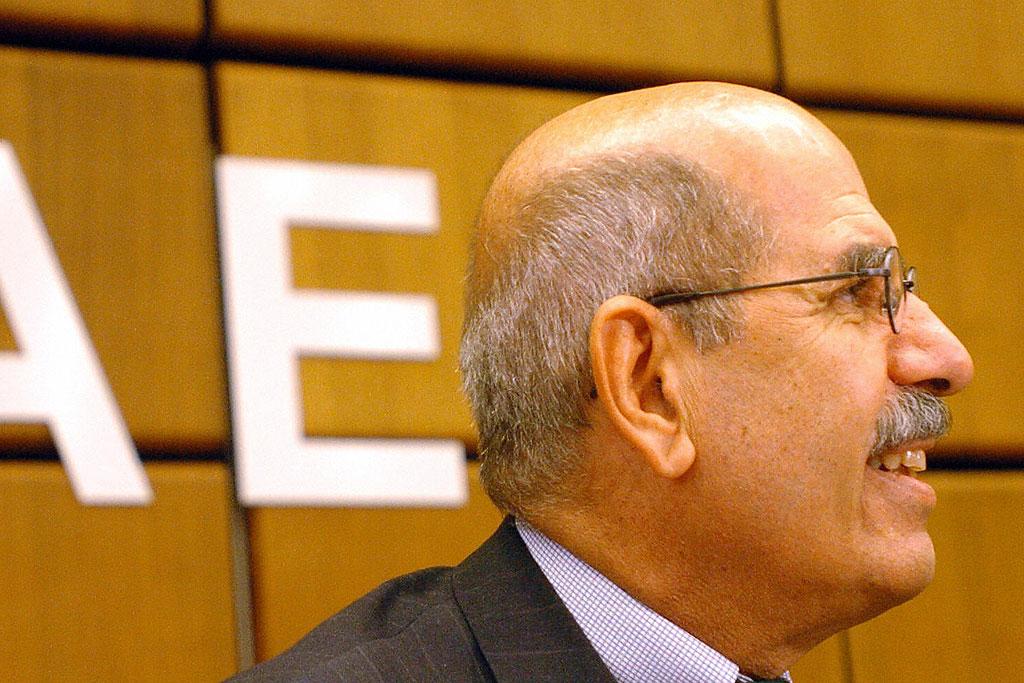Was ElBaradei ‘too soft’ on Iran?
Former general director of International Atomic Energy Agency Mohamed ElBaradei at a board of governors meeting in Vienna on September 13, 2004.
The United Nations nuclear watchdog is set to release a report this week containing evidence that Iran’s government has been much more active than previously thought in seeking the technology and materials needed to produce a nuclear weapon.
The International Atomic Energy Agency report will show that Iran “has mastered the critical steps needed to build a nuclear weapon,” the Washington Post reported.
Although the IAEA has chided Iran for years to come clean about a number of apparently weapons-related scientific projects, the new disclosures fill out the contours of an apparent secret research program that was more ambitious, more organized and more successful than commonly suspected.
The forthcoming revelations about Iran’s apparent nuclear ambitions, which were reportedly based on years of research and intelligence findings, may reignite criticism of the IAEA’s former director, Mohamed ElBaradei.
ElBaradei, an Egyptian reform activist and possible presidential candidate, once infuriated some Western governments by refuting intelligence that Saddam Hussein’s Iraq had been developing weapons of mass destruction.
The WMD claims have since been disproven, and ElBaradei shared the Nobel Peace Prize with the IAEA in 2005 for his efforts to halt nuclear weapons proliferation around the world.
But some Western and Israeli diplomats continued to accuse ElBaradei of politicizing his findings at the IAEA — especially regarding Iran.
A secret U.S. Embassy cable labeled the Egyptian chief as being “too soft” with Tehran. Some in Israeli media have claimed that ElBaradei was misleading the world about Iran’s nuclear intentions.
Much of the criticism was leveled because ElBaradei never presented concrete evidence — as many in the West were pushing — to prove that Iran was intending to build a bomb, rather than acquiring nuclear technology purely for civilian energy purposes.
ElBaradei instead stated during much of his 12-year tenure at the U.N. atomic watchdog that Iranian nuclear activities posed “no clear danger.” Although he stated that Iran desired the capabilities to build a weapon, and complained that Tehran denied the IAEA access to sites throughout the country, ElBaradei stated consistently that the Iranian threat perceived in the West was over-hyped.
It remains to be seen how the upcoming report will affet ElBaradei's image in Egypt and whether or not a potential oversight on Iranian nuclear ambitions with the new U.N. findings will further tarnish his legacy in the eyes of some in West.
In Egypt, it seems that many couldn't be bothered — Reuters reports that one recent survey placed ElBaradei seventh in a list of potential presidential contenders.
With at least one year to go before Egypt's presidential elections, ElBaradei’s campaign has struggled to gel. His entire campaign team in one northern Egyptian city recently quit due to concerns over ElBaradei’s management in Cairo, Reuters reported.
Some former staffers have criticized the former IAEA head for not working hard enough to connect with average voters outside of Egypt's capital.
Every day, reporters and producers at The World are hard at work bringing you human-centered news from across the globe. But we can’t do it without you. We need your support to ensure we can continue this work for another year.
Make a gift today, and you’ll help us unlock a matching gift of $67,000!
